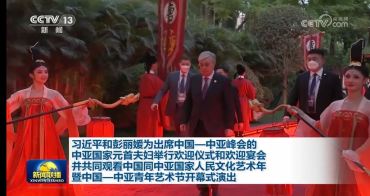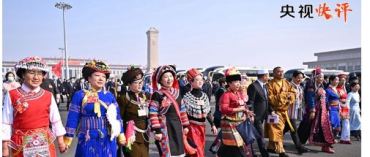This is a summary of how CCTV’s main evening news “Xinwen Lianbo” presented the Xi’an Summit in its May 19, 19 hours local time, edition. Analysis might follow in another blogpost.
Let’s focus on newsitems #1 and #3.1)
1. Banquet and Show, Thursday, May 18
Chronologically, Xinwen Lianbo’s coverage starts with newsitem #3, giving an account of the welcome banquet in the evening of May 18 in Xi’an, and a silk-road resonating happy-peoples show after that.
In his banquet speech, Xi says that “we sincerely welcome the east-Asian states to get onto China’s development express train” (我们诚挚欢迎中亚国家搭乘中国发展快车).
Newsitem #3 then continues with the First-Ladies’ program of the following day (May 19). Only two central Asian First Ladies are mentioned who joined China’s Peng Liyuan there, Aigul Japarova from Kyrgyzstan and Ziroatkhon Hoshimova (short form: Ziroat Mirziyoyeva) from Uzbekistan.

Tokayev’s arrival, May 18
2. The Summit, Friday, May 19
Newsitem #1 starts with the actual summit.
The five Presidents’ arrivals, “one by one” (中亚五国元首相继抵达, not from the plane, as they have attended the welcome banquet the night before).
Xi Jinping’s keynote speech at the May 19 summit is titled “Joining hands to build a Chinese-Central Asian community of common destiny2), by mutual support, joint development, universal security and friendship of many generations” (携手建设守望相助、共同发展、普遍安全、世代友好的中国-中亚命运共同体).
Back to the actual summit on May 19. Right after a referral to the historic “Silk Road”, a topic that also featured prominently in the post-dinner opera the night before, Xi comes back to his proposal ten years earlier of “jointly establishing a comprehensive revival of the Silk road”. It probably matters that he doesn’t refer to China’s proposal here, but to his, Xi’s, in-person advocacy back in 2013.
He then describes Central Asia he wants to see, or, in his now more modest words, the kind of Central Asia that “the world needs”. That’s
• a stable central Asia, i. e. sovereign and independent states with territorial integrity
• a prosperous central Asia
• a harmonious central Asia and
• a connective central Asia.
“Eight Persistences” (四个坚持)
To establish the envisaged Chinese-Central Asian community of common destiny, Xi sees a need for “four persistences”:
• Persistence in keeping watch and defending one another (守望相助), or, in some more detail, to deepen mutual strategic trust, and supporting one another when it comes to matters of core interests, such as sovereignty, independence, national dignity, and long-term development
• Persistence in joint development and marching in the first line of building the “one-belt-one-road”, in advocacy of global development, in unleashing the traditional potential for cooperation, poverty reduction, green and low-carbon growth, etc.
• Persistence in “universal security” (a term that has already been mentioned in the title of Xi’s speech), advocacy of global security, resolute opposition against “external forces'” interference in regional domestic politics (坚决反对外部势力干涉地区国家内政), so as to build a community that stays far away from conflict and always enjoys peace
• Persistence in friendship of many generations, implementation of the global civilization advocacy, exchange of governance experience, intercivilisational reflection, etc..
Trade, “anti-terrorism” measures and the D Pipeline
Xi’s keynote numerology continues with eight proposals.
Xi Jinping emphasized that this summit had built a new platform for China and central Asia and opened new perspectives for cooperation between China and central Asia. China would like to hold this summit as an opportunity to work closely with all parties, and to plan, build and develop cooperation between China and central Asia well.
习近平强调,这次峰会为中国同中亚合作搭建了新平台,开辟了新前景。中方愿以举办这次峰会为契机,同各方密切配合,将中国-中亚合作规划好、建设好、发展好。Firstly, we will strengthen the building of mechanisms. China has initiated the establishment of conferences and dialog mechanisms in the fields of industry and investment, agriculture, transportation, emergency management, education and political parties etc., so as to create a broad platform for comprehensive and for all sides beneficial cooperation.
一是加强机制建设。中方倡议成立产业与投资、农业、交通、应急管理、教育、政党等领域会晤和对话机制,为各国开展全方位互利合作搭建广泛平台。Secondly, we will broaden economic and trade relations. China will launch more initiatives to facilitate trade, to improve bilateral investment agreements, to make full use of the “green channel” for smooth bilateral customs clearance of agricultural products and by-products, hold live-stream get-together activities3) between China and central Asia on the topic of central-Asian products.
二是拓展经贸关系。中方将出台更多贸易便利化举措,升级双边投资协定,实现双方边境口岸农副产品快速通关“绿色通道”全覆盖,举办“聚合中亚云品”主题活动,打造大宗商品交易中心。Thirdly, deepening connectivity. China will upgrade cross-border transport capacities, support construction of the Trans-Caspian International Transport Route, promote the liberalization of the airfreight market, and develop regional logistical networks. It will strengthen the construction of train-consolidation centers within Trans-Eurasia Logistics, encourage superior businesses to establish overseas warehouses and build comprehensive digital service platforms.
三是深化互联互通。中方将全面提升跨境运输过货量,支持跨里海国际运输走廊建设,推进航空运输市场开放,发展地区物流网络。加强中欧班列集结中心建设,鼓励优势企业在中亚国家建设海外仓,构建综合数字服务平台。Fourthly, expanding energy cooperation. China has initiated the China-central Asia energy partnership, accelerated the China-central Asia D-pipeline consgtruction, expanded the scale of bilateral oil and gas trade, developed cooperation on the complete energy value chain, and strengthened cooperation in the field of new energy and peaceful use of nucelar energy.
四是扩大能源合作。中方倡议建立中国-中亚能源发展伙伴关系,加快推进中国-中亚天然气管道D线建设,扩大双方油气贸易规模,发展能源全产业链合作,加强新能源与和平利用核能合作。
Five, six and seven are about promoting green energy, improving development capabilities, and dialog between civilizations. Item six may be interesting in terms of Chinese financial support for the central Asian states, partly non-repayable (无偿援助). this seems to spell preferential treatment for central Asia, as China has become known as a rather unforgiving creditor worldwide.
And item eight is mostly about East Turkestan. Obviously, neither that name, nor China’s preferred handle for it, “Xinjiang”, appear here, but that’s what it is mostly about. Cyber security and reconstruction of Afghanistan are also mentioned.
China-style modernization (中国式现代化)
Then Xi describes recent political events in China, and issues an invitation again.
Concluding, Xi Jinping pointed out that the CPC’s 20th National Congress has specified the central tasks of comprehensively building a socialist, modern and strong country, to achieve the second centenary goal, to comprehensively carry forward the great rejuvenation of the Chinese nation by means of Chinese-style modernization. We want to strengthen theoretical and practical exchange with central Asian countries about modernization, promote connections of development, and create still more opportunities for cooperation, and joint efforts of our six countries in their modernization processes. Let us work hand in hand, struggle collectively, actively promote common development, common prosperity, and welcome a better future for our six countries together!
习近平最后指出,中国共产党第二十次全国代表大会明确了全面建成社会主义现代化强国、实现第二个百年奋斗目标、以中国式现代化全面推进中华民族伟大复兴的中心任务。我们愿同中亚国家加强现代化理念和实践交流,推进发展战略对接,为合作创造更多机遇,协力推动六国现代化进程。让我们携手并肩,团结奋斗,积极推进共同发展、共同富裕、共同繁荣,共同迎接六国更加美好的明天!
Replies
Then it is the turn of the visiting five.
The five central Asian heads of state, one after another, thanked China for initiating and successfully holding the first China-central Asia summit, and they evaluated the fruitful results of the comprehensive cooperation positively. they said that the central-Asian countries shared a millenium of profound friendship with China, had always helped each other, trusted each other as good neighbors, good friends, and good partners, and the most sincere old friends at the Yang Pass4) in China’s West. Currently, China has become a key force in ensuring global security and stability, and the promotion of technological and economic development. Cooperation with China is an important and essential factor for all countries to achieve sustainable development. Further deepening relations with China is in line with the hopes of the five central Asian countries peoples, and each country’s fundamental and long-term interests. The China-Central Asia Summit will provide a new platform for cooperation between the central Asian countries with China and show the way into the new era of the two sides’ relations. All sides welcome and appreciate china’s policy of friendly cooperation with central Asia, wish to continue to give full play to the heads of states’ diplomatically leading strategic roles, make the mechanisms from the summit bigger and stronger, strengthen top-level design and overall planning, deepen central Asian countries’ comprehensive pragmatic cooperation with China, to bring about more benefits for all the peoples of every country, to help with all countries achieving common development and prosperity, and to make contributions to the promotion of regional security and stability.
中亚五国元首先后发言,感谢中方倡议并成功主办首届中国-中亚峰会,积极评价中亚国家同中国全方位合作取得的丰硕成果。他们表示,中亚国家同中国拥有千年友好和深厚情谊,始终是相互支持、相互信赖的好邻居、好朋友、好伙伴,是中国西出阳关最真挚的故人。当前,中国已经成为保障全球安全稳定和促进科技经济发展的关键力量,同中国合作是各国实现可持续发展不可或缺的重要因素,进一步深化中亚五国同中国的关系符合各国人民共同愿望,符合各国根本和长远利益。中国-中亚峰会为中亚国家同中国合作提供了新平台,引领双方关系进入了新时代。各方欢迎并赞赏中国对中亚友好合作政策,愿继续充分发挥元首外交战略引领作用,做大做强中国-中亚峰会机制,加强顶层设计和统筹规划,深化中亚国家同中国全方位务实合作,为各国人民带来更多福祉,助力各国实现共同发展繁荣,并为促进地区安全稳定作出应有贡献。The five heads of state said that they firmly supported each others’ choices in line with their own countries national conditions and development paths, firmly defended all countries’ sovereignty, independence, security, territorial integrity and other core interests, and firmly opposed interference in other countries’ domestic politics. They rated highly Chairman Xi Jinping’s concept of a community of common destiny of mankind and global security initiative, global development initiative, global civilizations initiative, and said they would conscientiouyly implement the important consensus and results achieved at this summit. By using the opportunity of the “one-belt-one-road” initiative ten years ago, they would strengthen their respective countries’ develop strategies to the joint building of “one belt one road”, promote regional online communications, deepen trade and investment, agricultural, energy, technological, security etc. pragmatic cooperation, strengthen civilizational exchange, jointly react to challenges, achieve cooperation and win-win, and build a still closer chinese-central Asian community.
五国元首表示,坚定支持彼此选择符合本国国情的发展道路,坚定维护各国主权、独立、安全、领土完整等核心利益,坚决反对干涉他国内政。他们高度评价习近平主席提出的构建人类命运共同体理念以及全球安全倡议、全球发展倡议、全球文明倡议,表示将认真落实此次峰会达成的重要共识和成果,以共建“一带一路”倡议提出十周年为契机,加强各自国家发展战略同共建“一带一路”对接,推进地区互联互通,深化贸易投资、农业、能源、科技、安全等领域务实合作,加强人文交流,共同应对挑战,实现合作共赢,构建更加紧密的中国-中亚命运共同体。
Concluding events
Newsitem #1 ends with a note that a “Xi’an Declaration of the China-Central Asia Sumiit” was signed, and that a “List of Outcomes of the China-central Asian Summit” was adopted. The second summit is scheduled for 2025, in Kazakhstan, and a permanent secretariat to be established in China.
The newsitem ends with Xi and the five visiting heads of state “meeting journalists” and their planting of six pomeganate trees.
________________
Notes
1) Evening newsitems, May 19
2) also known as “community of shared future”
| 3) | I wouldn’t have found this translation myself; it’s taken from the official English translation of Xi’s keynote speech, and “live-streaming sales event to further promote Central Asian products” appears to be the translation for ““聚合中亚云品”主题活动” (if it isn’t an earlier or more recent transation) |
| 4) | English: “Sun Gate”, as described here by Wikipedia. The Yangguan or Sun Gate also plays a role in Tang poetry. |
________________








[…] temporary, too, just as they are at Argentine Radio and TV, and disputes over journalistic content don’t appear to…